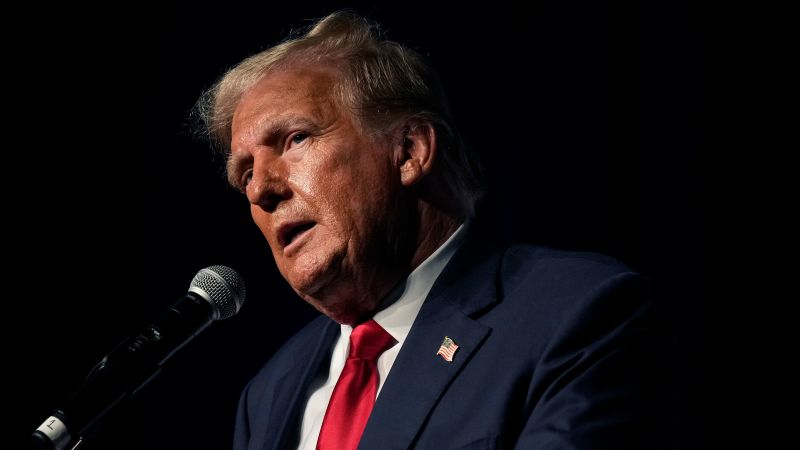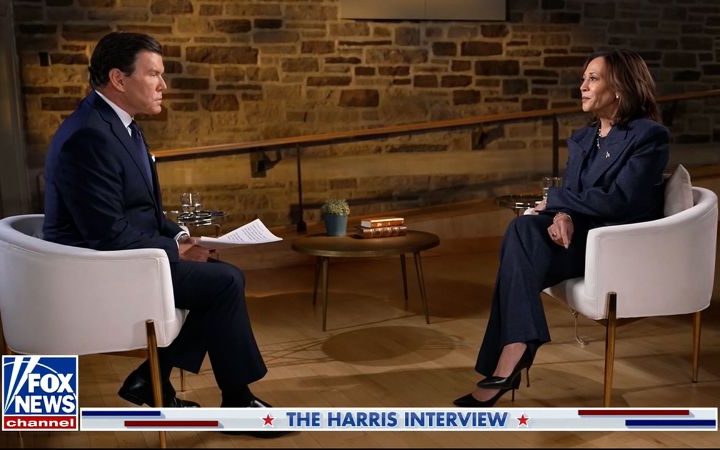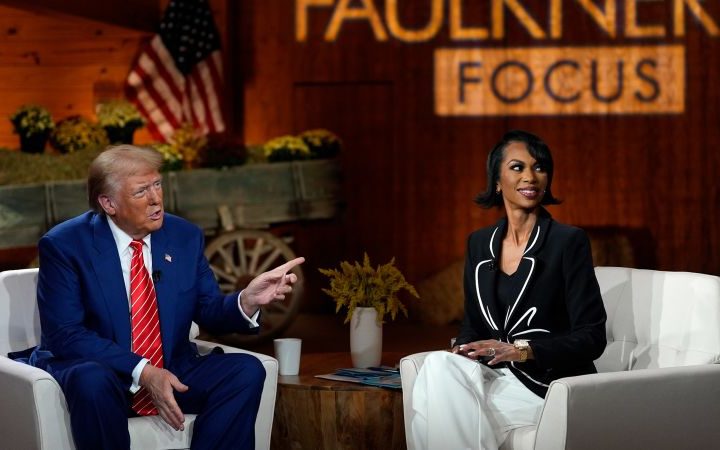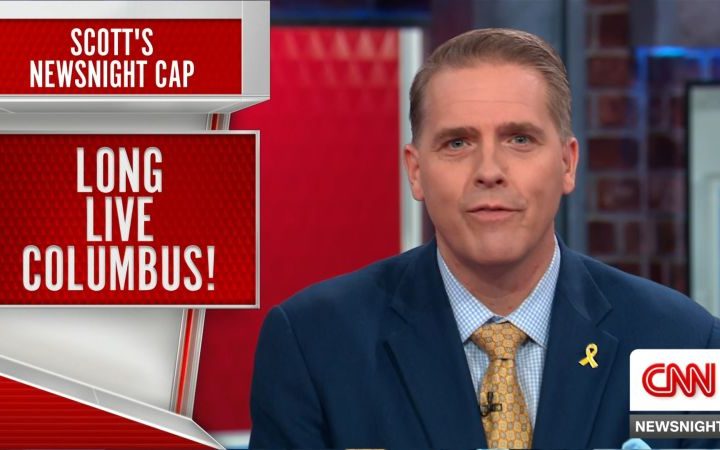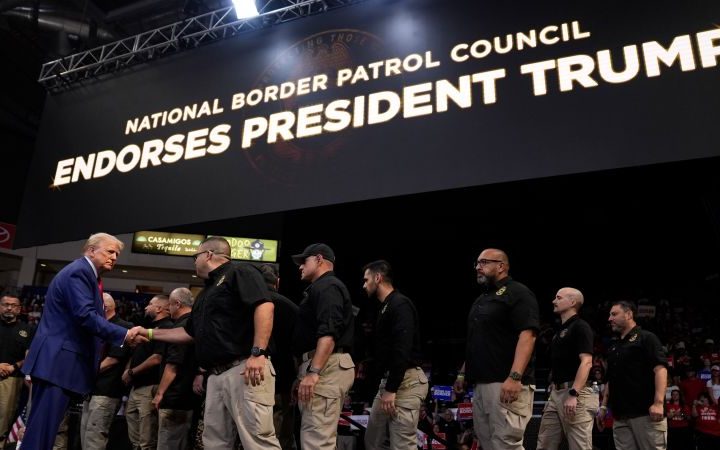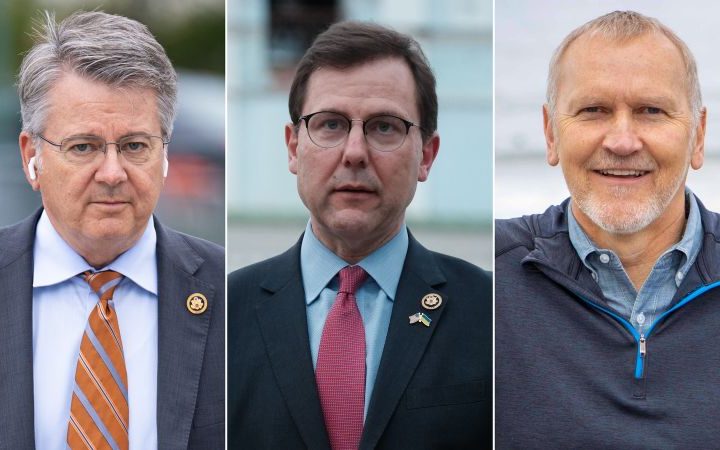Donald Trump’s inflammatory and artless comments about Hamas’ horror in Israel emphasize the defining characteristic of his attitude toward foreign policy and his entire political world view: It’s all about him.
Trump criticized Israeli Prime Minister Benjamin Netanyahu, lauded Hezbollah militants as “very smart” and sought political gain from the attacks that killed 1,200 people by claiming that if the last election was not “rigged,” he’d be the American president and they’d never have happened.
The ex-president openly admitted a grievance against Netanyahu, complaining he had pulled out at the last minute from joining the US air attack that assassinated Iranian intelligence chief Qasem Soleimani in Iraq in 2020. Trump had previously fumed over the Israeli leader’s perceived disloyalty in recognizing he lost the election.
Trump is now a private citizen, and it’s possible he wouldn’t have addressed the situation in the same way if he were president – although there were multiple examples of his tone deafness and indiscretion when he was in the White House. But he’s also the 2024 Republican front-runner for president and his statements are therefore scrutinized for clues over how he would behave in office. His latest comments add to plentiful evidence that a second Trump term would be even more riotous at home and globally disruptive than his first four years in power.
The former president’s remarks also offered an opening to his GOP rivals, who accused him of behavior unsuitable for a potential commander in chief after an ally came under attack amid horrendous scenes of carnage in which some Americans were also killed. Some bemoaned his apparent admiration for Hezbollah, a Lebanese militia group that is hostile toward Israel.
“He’s a fool. Only a fool would make those kinds of comments,” former New Jersey Gov. Chris Christie, who has rooted his campaign in criticizing Trump’s suitability for office, told CNN.
“Only a fool would give comments that could give aid and comfort to Israel’s adversary in this situation,” Christie continued. “This is someone who cares, not about the American people, not about the people of Israel, but he cares about one person and one person only, the person he sees in the mirror when he wakes up in the morning.”
The former president tried to defuse the growing controversy on Thursday evening, releasing a statement in which he insisted that “there was no better friend or ally of Israel” than him. He accused President Joe Biden of weakness and incompetence. “With President Trump back in office, Israel, and everyone else, will be safe again!” he said. The former president was continuing the clean-up on Friday on his Truth Social platform, praising what he said was the “skill and determination” of the Israel Defense Forces and later posting “#IStandWithBibi.”
Trump’s original grievance-based analysis reflects a transactional, unorthodox approach to foreign policy that often prioritizes his own personal goals over a standard understanding of the national interest. It also highlighted a contrast with his potential 2024 election opponent. Biden reacted to the attack by using all of the tools of traditional statesmanship, including rhetoric, personal behind-the-scenes contacts with key foreign leaders and by mobilizing allies. Like Trump, Biden has had a personal and political beef with Netanyahu – but shelved his differences with him weeks before the attack and has been in constant contact with the prime minister since it occurred.
Biden is seeking to strike a balance. He has shown the most ardent support for Israel of any recent US president and acknowledged its desire to retaliate and reestablish its sense of security after the most shocking penetration of its borders and national psyche in 50 years. But Biden is also sending private and public signals to Netanyahu that Israel’s response should not infringe the laws of war and that he should consider the humanitarian consequences of an invasion of Gaza, as he seeks to prevent the war escalating into a dangerous regional conflict that could draw in the US.
Biden’s opponents have every right to critique his foreign policies and to ask whether a hands-off approach to the Israeli-Palestinian conflict meant his administration dismissed the threat from Hamas. Critics also argue his attempts to open dialogue with Iran, a key sponsor of the militant group, emboldened the Islamic Republic and threatened Israel’s security. But Biden is also forging a contrast of temperament and approach with Trump that will be at the center of his campaign’s narrative if the 2024 election is a rematch of 2020 and will boil down to this question to voters: Is Trump fit for the Oval Office?
Trump said on Fox News on Wednesday that Netanyahu had been “hurt very badly” by the attacks. “He was not prepared, and Israel was not prepared,” the former president said. His comments were not necessarily wrong and the intelligence and political failures in Israel will be investigated after the war. But the timing and tone of criticism is questionable given that Israel, one of America’s closest allies, is suffering after a horrendous attack on civilians and is in need of support not political points scoring and second guessing. His willingness to trash Netanyahu, despite the Israeli leader’s considerable efforts to align himself politically with the ex-president, also shows how loyalty is usually a one-way street for Trump and those who he believes have crossed him are liable to get a public dressing down.
Trump’s comments were not the first time he has appeared to seek a political benefit from his foreign policy and his positions on Israel especially. Last October, he complained that American Jews were not sufficiently grateful to him for actions like moving the US embassy from Tel Aviv to Jerusalem when he was in the White House.
“No President has done more for Israel than I have,” Trump wrote on his Truth Social network, adding that it was somewhat surprising that “our wonderful Evangelicals are far more appreciative of this than the people of the Jewish faith, especially those living in the U.S.” He was accused of using antisemitic tropes demanding the loyalty of American Jews. The White House said he insulted Jews and Israelis.
Trump’s remarks Wednesday on Hezbollah, which has the capacity to rain even more carnage on Israel, also appeared inappropriate in the circumstances. “They’re vicious, and they’re smart. And, boy, are they vicious, because nobody’s ever seen the kind of sight that we’ve seen,” Trump said during a political event in Florida. His statement was in keeping with his habit of praising foreign adversaries he sees as tough even if they rule with an iron fist, infringe basic humanitarian values and are US adversaries. He’s rarely concealed his admiration of Chinese President Xi Jinping and North Korean tyrant Kim Jong Un, for instance. And he added to his long record of praising Vladimir Putin – an accused war criminal because of atrocities committed during the war in Ukraine – when he recently described the Russian leader as “a genius.”
Trump often appeared to be willing to cede national interests to his political benefit while in office. For instance, at a summit with Putin in Helsinki he sided with Putin who dismissed findings by US intelligence agencies that Russia interfered in the 2016 election in attempt to help him.
The former president is advocating a return to his “America First” nationalist foreign policy, prizes tough talk and ruthlessness on the global stage, and remains disdainful of allies and the international security architecture that has been the foundation of American power since the end of World War II. While these are positions that would represent a sharp transformation of US foreign policy, it is quite legitimate for him to present them to voters and try to win support for his vision.
Yet his recent comments will only reinforce the impression often left by his actions as president that his own aspirations are most important. They also show Trump’s quintessential contempt for the rules of politics, foreign policy and even basic human decency, which explain why he horrifies many Americans and foreign governments. But this behavior is key to his authenticity for grass roots Republicans who abhor the codes of what they see as establishment elites.
Trump during the Florida event criticized Israel for not taking part in the raid that killed Soleimani. “I’ll never forget that Bibi Netanyahu let us down. That was a very terrible thing, I will say that,” he said. It was not immediately clear whether Israel had considered an operational role in the strike or whether Trump had broken a confidence with an ally or even revealed classified information.
The ex-president has a record however of loose talk on government secrets. He has been indicted over the alleged mishandling of national security material among classified documents he hoarded at his Mar-a-Lago resort after leaving office. Last week, ABC News reported that Trump allegedly shared US secrets about the submarine service and nuclear weapons with an Australian billionaire. Trump denies all wrongdoing.
The ex-president’s GOP rivals, who have struggled to exploit his political vulnerabilities without alienating his super loyal supporters pounced on his criticism of Netanyahu.
Florida Gov. Ron DeSantis accused Trump of throwing “verbal grenades” at Israel. “Now’s not the time to be doing, like, what Donald Trump did by attacking Prime Minister Bibi Netanyahu, attacking Israel’s defense minister, saying somehow that Hezbollah were ‘very smart,’” DeSantis said in New Hampshire. “Now’s not the time to air personal grievances about an Israeli prime minister.” Former Vice President Mike Pence hammered Trump’s foreign policy – even though he was part of the former president’s administration that repeatedly challenged American values. Pence also claimed that Trump had somehow changed in his years out of office, a debatable proposition that looks self-serving since it appears intended to create plausible distance from Trump’s excesses while in office.
“He’s simply not expressing, and his imitators in his primary, are not expressing the same muscular American foreign policy that we lived out every day,” Pence said on a local New Hampshire radio.
What Trump is expressing is his idiosyncratic, convention-busting brand of foreign policy rooted in his personal prejudices, grievances and search for political advantage that will once again rock the world if he wins the 2024 election.
Read the full article here
